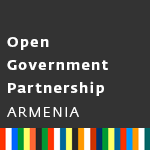1. Formation of legislative framework defining Data policy
| Commitment Start and End Date: | 11.2022 - 06.2024 |
| Lead implementing agency: | Ministry of High-Tech Industry |
| Person responsible from implementing agency: | Ministry of High-Tech Industry |
| Title, Department: | Office of Deputy Prime Minister Mher Grigoryan |
| Email: | info@hti.am |
| Phone: | +10590189 |
Other actors involved
Other state actors involved
Office of Deputy Prime Minister Mher Grigoryan, National Security Service, Ministry of Foreign Affairs, Ministry of Justice
Civil society, private sector
"Digital Armenia" NGO
Other NGOs and organizations that will join the commitment
Central Bank
"EKENG" CJSC
International and local professional companies, private experts
Issue subject to regulation
Currently, the policy and institutional regulations regarding data and information systems in Armenia are fragmented and partial; they do not fully correspond with the developments of the time and the needs of the development of digital and virtual economy, public service provision and management systems.
Therefore, it is necessary to develop and implement unified and comprehensive legal regulations, which will mark the entire framework of relations regarding data and enforcement mechanisms.
Main objective
Elaboration of the legislation defining the data policy is aimed at the regulation of relations regarding the formation and use of data in Armenia and the formation of institutional frameworks with the adoption of the open data doctrine. The legislation of the Republic of Armenia will enable to clarify the rights and responsibilities of data market participants, the regulatory authorities and other institutional mechanisms with the best available solutions, with the aim to establish legal grounds necessary for providing safe and citizen-centred services, increasing the efficiency of the public administration system, promoting the competitiveness and efficiency of the economy, and developing the digital economy and digital society.
Brief description of commitment
In the context of modern technological developments, data and data and information systems management are of key importance for the effective establishment of a society, economy and state. Accordingly, the strategic agendas of the Republic of Armenia for digitalization and public administration reforms have considered the formation of institutional mechanisms of data management in the country as an agenda priority, emphasizing first of all the formation of the legislative framework defining the general policy regarding data.
Under the mentioned strategic agendas, the ideology of considering the data as public wealth underlies the state policy. The establishment of a complete institutional and legislative system of data management is of the utmost importance not only for the effective state system and the effective provision of state services, but also for increasing the productivity and competitiveness of the private sector.
The formation of institutional and legislative foundations of data management is an opportunity to create the framework of a law-based and citizen-centred formation and operation of administrative information systems, introduction of data access mechanisms with the logic of open data policy, introduction of systems for citizen inquiries and traceability regarding his/her personal data, interoperability of administrative information systems, data management standards, the scope of data-related rights and responsibilities, etc..
OGP challenge addressed by the commitment
Currently, the policy and institutional regulations regarding data and information systems in Armenia are fragmented and partial; they do not fully correspond with the developments of the time and the needs of the development of digital and virtual economy, public service provision and management systems.
Therefore, it is necessary to develop and implement unified and comprehensive legal regulations, which will mark the entire framework of relations regarding data and enforcement mechanisms.
Relevance to OGP values
1. How will the commitment promote transparency?
The legislation defining the data policy will include regulations on the rights and responsibilities of those carrying out actions regarding the data, their receipt, processing, storage, transmission and other actions; the system of rules related to data access and transparency will also be formed based on the doctrine of open data; legal grounds and standards for data catalogues and on ensuring public access to meta data will be provided.
2. How will the commitment help foster accountability?
The standards of data classification, usage, quality assessment, identification, data protection and accurate distribution, risk management principles, responsibility and accountability, and other legal relations will be defined and specified by the legislation of the Republic of Armenia.
3. How will the commitment improve citizen participation in defining, implementing, and monitoring solutions?
The elaboration and actual implementation of data legislation based on the open data policy will also contribute to the development of citizen-state communication and participatory management systems through the implementation of more intelligent and mutually reliable solutions and platforms. At the same time, the data legislation will also ensure a sufficient legal infrastructure, which will enable to introduce systems for public service quality monitoring, control and management, to encourage the practices of designing and provision of citizen-centred public services and those based on the experience of a citizen.
Ambition
The elaboration and adoption of data policy legislation will enable to fully regulate the field of relations for the digital economy, digital society and digital state and services, which will, in its turn, improve the quality of data, access and their safe management. The quality of services being provided to the public, the public confidence in state data and information systems, and the usage of digital services will significantly increase. As a final result, it is expected to create complete legal grounds critical for development of citizen-centred and data-based policy, and development of economy and digital society.
Potential Impact:
Implementation status
UN Goals
«ԲԱՑ ԿԱՌԱՎԱՐՄԱՆ ԳՈՐԾԸՆԿԵՐՈՒԹՅՈՒՆ» ՆԱԽԱՁԵՌՆՈՒԹՅԱՆ ՇՐՋԱՆԱԿՆԵՐՈՒՄ ՀԱՅԱՍՏԱՆԻ ՀԱՆՐԱՊԵՏՈՒԹՅԱՆ 2022-2024 ԹՎԱԿԱՆՆԵՐԻ ԳՈՐԾՈՂՈՒԹՅՈՒՆՆԵՐԻ ԾՐԱԳԻՐ
